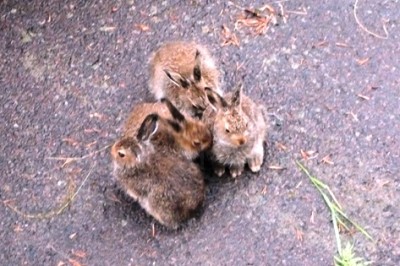There’s a time for swinging in the breeze and a time for working, and over the last week the two have been as well balanced as my new hammock. In this extraordinary weather (‘don’t expect to see it for another hundred years,’ says our neighbour) the bridge railings, an outhouse building, and part of a side of the house has been painted, the meadow has been cut back, all the cuttings removed, an overgrown bush has been severely trimmed, and next winter’s wood supply has been chopped into manageable pieces. Sometimes we’ve even complained about the heat, and twice I’ve been to a nearby lake to swim – the first time the water has been anything other than blisteringly cold.
Despite three weeks of heatwave, nearby wildlife apparently has no need of the water put out by me (a reflex reaction by me after years of living in more urban environments). In sharp contrast, my time in the hammock has been spent, usefully, reading a book about the problem of water shortages in the American west – or rather, the problem of people expecting water and other people delivering it. Here, on the other hand, the ground is so steeped in water it never dries out. In my view any plants not cunning enough to reach sources of water in this landscape don’t deserve to live, and that is my excuse for not watering the flowers (planted by the previous owner, in need of watering according to our neighbour).
I don’t wish to be smug, but there is something calming about the feeling that you live in a landscape that looks after itself. Of course, it doesn’t, the observant of you might say, since I’ve complained rather too often about the hard work of removing overgrown grasses in summer and snow piles in winter. But I know that all we need to do is to allow our land to become birch scrub, and stop wanting to use a garage in the winter, and nearly all of this work would be gone. Another few years maybe, and we might give up struggling against nature.
Here more than anywhere else it’s clear the struggle is futile. To start with this can feel depressing, if you’re an achiever, but soon it’s a relief. You can’t win, you can only try. The secret of the happiness brought by the activity of gardening, they say, is that you never finish it, so the happiness is constantly renewed.
Which brings me to parenting. I have heard it said that parenting these days is a lifelong responsibility. Nature has organised things rather differently it seems. I wanted to find out more about the arctic hares in our garden, since our resident hare has just had a litter of four bright-eyed young (‘leverets’) that scurry around at night investigating our grass piles. According to internet sources, the ‘polar rabbit’ feeds its young for eight weeks. After that they’re on their own.
Now we’re on Hare Watch at about midnight every night (still broad daylight here), when all the young hares instinctively gather together in a small pile outside our window and wait for the mother to arrive. They rub against one another, groom one another, climb on top of one another, turn their backs on each other – all in a small space about the size of a mother hare’s belly. We wait. She appears within a thirty minute time gap, and right there in the middle of the road (thankfully empty at that hour) the four young are fed for a maximum of three minutes, before she leaps off somewhere else. We don’t know how old they were when we first spotted them, so how much longer all this goes on is unclear.
It means we go to bed rather late every night, but somehow we just can’t resist waiting to see if she comes. Every night we wonder if this might be their last night. Or she may not appear, and what happens then? Do they sit out there all night, just waiting? Do we?
A couple of days ago I sat by a lake, after a refreshing swim. It was Friday night, the end of the working week. Some of Kiruna’s youth were evidently out in small boats on the lake, heading for a stationary houseboat in the centre. There was much whooping and shrieking, and although I couldn’t easily see their antics from where I sat – there were people leaping into the water and back on the houseboat – I could hear them.
I sat there for a few hours. During that time the boat activity lessened and I could just about make out their figures huddled together on the top deck of the houseboat. The whooping had turned to singing (no doubt with the lubricant of alcohol), or almost singing – it was hard to tell the tunes. The wailing continued, and was soon joined by the howling of husky dogs on the other side of the lake.
There they all were, in a small pile, on top of the houseboat, waiting. I left, so I never found out what happened next.


